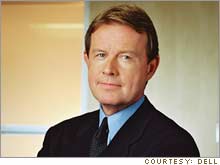|
Dell losing support on Wall Street Filings show major shareholders trimming stake in No. 1 PC maker as analysts downgrade recommendation; some focus criticism on CEO. NEW YORK (CNNMoney.com) -- Wall Street is logging off of Dell, as major shareholders trim their holdings and analysts advise customers to dump declining shares in the face of continued disappointing results. Filings with the Securities and Exchange Commission show that many of Dell's largest shareholders have significantly reduced their exposure to the world's No. 1 maker of personal computers during the second quarter. Analysts at UBS and Goldman have downgraded the stock since it reported lower earnings Thursday, with both now urging shareholders to reduce their positions.
The company has also been hit by a recall of 4.1 million laptop batteries because of the risk that they could overheat and catch fire. Shares of Dell (Charts) lost 54 cents, or 2.4 percent, in trading Monday, and it is now down about 40 percent over the past 12 months, as the company has warned four times since February that its earnings would not meet Wall Street expectations. Among the institutional shareholders that made significant cuts their Dell holdings, according to shareholder tracking service LionShares, are Wellington Management, which trimmed its holdings by 50 percent in the second quarter; American Century Investment Management, which reduced its Dell stake by a bit more than a third; T. Rowe Price Associates, whose Dell holdings are down 29 percent; and Fidelity Management & Research, which lowered its Dell position by 21 percent. All remain among the 25 funds with the greatest Dell holdings, even with their reduced positions. Much of the growing criticism of Dell on Wall Street is focused on CEO Kevin Rollins, with many telling The Wall Street Journal that the company's share price and performance could both benefit from a change at the top. The Journal's influential "Heard on the Street" column Tuesday reported that Andrew Neff, an analyst at Bear Stearns Cos., said Dell needs to get a "real sense of urgency. You're going to need that either from Kevin Rollins or his successor." And, so far, Neff told the paper, "you're not seeing that" from Rollins. Rollins became CEO in July 2004, succeeding company founder and Chairman Michael Dell in that job. Michael Dell remains very supportive of Rollins, according to the Journal's column, but some critics suggested that Dell has far more support on Wall Street than his handpicked CEO. "People have a lot of regard for Michael Dell. He's made a lot of strategic decisions for Dell recently that people generally have liked," Goldman analyst Laura Conigliaro, one of those who downgraded Dell shares last week, told the column. |
Sponsors
|

